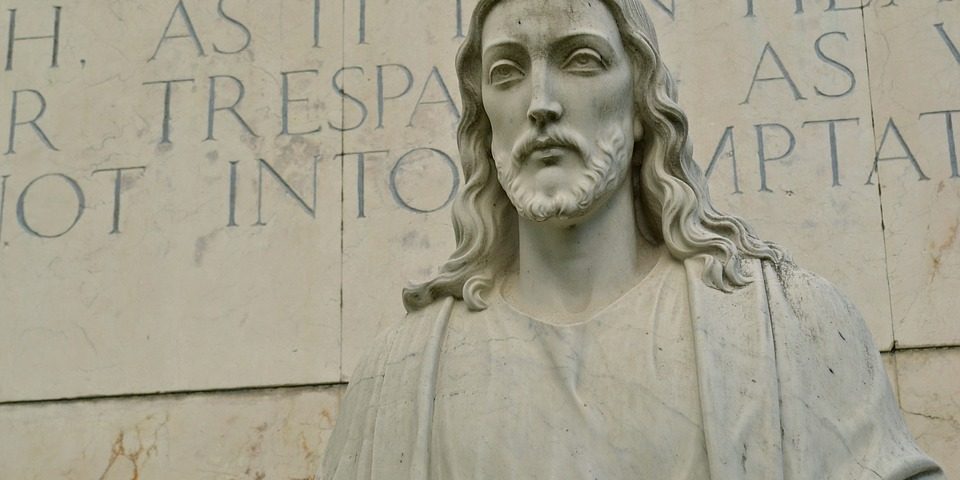Words, to quote T. S. Eliot, “Crack and sometimes break.”[1] C. S. Lewis called it “verbicide,” the killing of a word by overuse.[2] This can sometimes happen to words: they get worn out and bent, sometimes corrupted and altered beyond their original meaning all together, sometimes for better, sometimes for worse.
Words are important, however. They are, as G. K. Chesterton said once, “the only things worth fighting about.”[3] In the Christian tradition a reverence for words and for language is fundamental, part both of our Greek and Hebrew heritage. God is “Word” in our tradition, an uncreated rationality which not only created everything, but which inscribes everything with a discernible reason. That’s why words themselves have always been important, for without them we are without meaning and separated thereby, in some sense, from our word-like God. Saint Basil the Great said that only those who are “idle in the pursuit of righteousness” discount the importance of words. “[T]o scrutinize syllables,” he said, “is not a superfluous task.”[4] To the medieval monk words and books were sacred and the stuff of prayer; whenever a monk finished copying a book in the scriptorium, for example, he would offer it first to God in prayer: “Receive, O Holy Trinity, the offering of this codex…”[5] Words, to put it simply, matter. They matter a great deal. We should watch what we say, first thinking about it deeply and even prayerfully. I know we don’t normally think about this, but it’s actually essential to the Christian life—words and their meaning. If ours is a religion of the Word made flesh, how could it be otherwise?
Now I bring this up not to be academic but rather to make a point, an important one about the need for Christians to think more deeply about the words they use and the words used by the world, even religious words. “Nothing is easier,” Newman said, “than to use a word, and mean nothing by it.”[6] Even the word “God.” And so, on this day upon which we’re asked to consider Divine Mercy and also peace, we would do well to think about what those words actually mean. Because, as I said, words can bend and break, and rich theological mysteries are sometimes reduced to thin platitudes and gimmicks. Pope Francis himself said this about the word “solidarity,” that it’s “a little worn and at times poorly understood.”[7] The same is true at times of the words “peace” and “mercy;” they get a little worn and at times poorly understood. Dr. King, for example, talking about the onetime legal doctrine of separate-but-equal, called it “a negative peace.” That is, what some were calling peace, really wasn’t peace. “True peace,” he said, “is not merely the absence of some negative force…it is the presence of some positive force—justice, goodwill and brotherhood.”[8] Augustine too warned about confusing earthly peace with heavenly peace; that’s a dangerous thing to do as history’s many bloody utopias show.[9] If we’re to be faithful to the Church’s idea of mercy, faithful to scripture, and to the Word of God himself, we must pay attention to our words and exactly to what we think we mean when we talk about things like mercy and peace. Being faithful, quite simply, demands it.
This is where today’s gospel comes in. As Christians we know, as Paul clearly taught, that true peace comes by way of Jesus Christ, through faith in him putting us at peace with God and with each other.[10] But it’s a peace—and this is the secret and Christian difference—that comes not by violence or by the oppression or elimination of an enemy, but by forgiveness within which is the power of the resurrection, grace and life more powerful than evil and death. Christian peace, true peace is not achieved in the defeat or in the destruction of our enemies, but only when we forgive those who hurt or mistreat us. This, if you’ve never heard it before, is the gospel of Jesus Christ.
Why else did he show us his wounds? Imagine the scene: standing before the disciples, he says, “Peace be with you.” And then immediately he shows them his wounds; and then he says, “As the Father sent me, so I send you.” And then he talks about the forgiveness of sins. He tells them that their mission is to forgive sins.[11] That’s how this peace, issuing from the risen wounds of Jesus, is to be with us—through forgiveness, through mercy.
And although it’s grace, it’s not magic. What Jesus is calling for here—and giving us the grace to accomplish—is a moral and ethical revolution, a new and radical way of acting in this world still stuck on Good Friday. Showing us his wounds, it’s as if Jesus is saying, ““See what I have forgiven: the insults and injustice, torture and murder. And see, I have risen! I have the peace of God. And it can be your peace as well, but you must forgive in the same way and to the same extent that I have forgiven you my disciples who ran away, and even those who crucified me. If you want the peace of God, you must forgive without limit as I have done.” That’s the message and the moral of this grace. This is what peace actually is—the fruit of forgiveness offered by people who believe in the resurrection enough, and who live in Christ enough, to live in radical imitation of the Jesus who offered forgiveness while the nails were in still his hands, forgiveness for the very people who hammered those nails in. Can you forgive while the nails are still in your hands? Can you forgive your enemy while he still holds the hammer? The risen Lord seems to suggest that we must. Peace is the kingdom which mercy builds, brick by brick in every act of forgiveness which by grace you’re brave enough to perform, and not just for your friends, but for your enemies too—like Christ.
That’s what peace is—the triumph of life over death present in the resurrection of Jesus and in the new ethics of resurrection lived out by those who believe in it. It’s not some faint, fake idealistic notion for the naïve; rather, it’s the power of God revealed in the refusal to give way to evil and the fear of evil, in the courageous willingness to live righteously and peacefully in a dark and frightening world. And that’s what mercy is—the willful choice to forgive when, according to the normal way of thinking, it makes no good sense to forgive. Mercy is not some shallow concept of affirmation—“I’m okay, you’re okay”—or some shallow idea that sin isn’t really sin; rather, it’s an act of the will, perfected by grace, to forgive that so-and-so even though he doesn’t deserve it—because we didn’t do anything to deserve forgiveness either—to forgive, only because God has chosen to forgive us by eternal and divine decree, a wisdom we have no capacity to second guess. Peace is the kingdom mercy builds, and that’s why God gives us grace—because it isn’t easy, it’s hard. It demands of you all your strength and every virtue. It demands that you rise above emotion. This is why Jesus, after showing the disciples his wounds, giving them peace and their mission to forgive, also gave them the Spirit—the same Spirit present in us, we with the same peace and the same mission.
And so if we’re to be peaceful and merciful as Jesus commands (and to be clear, as Christians, we can’t opt out of this), we must be people of strength and character. We must be people who know God and know the meaning of our words. We must know what we mean when we talk about peace and mercy. Otherwise we’re just adorning our own agendas with our own misconstrued religious verbiage. We must know what we mean if we’re to be meaningful. To be peaceful and merciful, you must be strong and bravely imitate Christ, as strong as the Crucified who forgave the crucifier. And God will make you strong if you allow it, if you want it, if you pray for it.
Shakespeare wrote that mercy “‘Tis mightiest in the mightiest.”[12] Mercy is not weakness, it’s strength. But you need God’s grace to be that strong. You need to give God everything, your mind and your will, so that he can give you his. And then you’ll truly be strong, mightiest among the mighty but in God’s way—which is the only way of peace, the strength to forgive that so-and-so and even your enemies, to make them your brothers and sisters even if you have to give your life for it. That’s what Jesus did. Why do you think your vocation is any different than his? Didn’t he tell us to take up our crosses too? Strong souls willing to risk mercy and peace: that is what Easter means morally. That’s the only reason we sing “Alleluia”—for that, this grace which passes all understanding.[13] Grace for you. Amen.
[1] T. S. Eliot, The Four Quartets, Burnt Norton, V
[2] C. S. Lewis, Studies in Words, 7
[3] G. K. Chesterton, The Ball and the Cross, 96
[4] Basil the Great, On the Holy Spirit 1.2
[5] Jean Leclercq, The Love of Learning and the Desire of God, 122
[6] John Henry Newman, The Idea of a University, 28
[7] Pope Francis, The Church of Mercy, 24
[8] Martin Luther King, Jr., I Have a Dream, 17
[9] Augustine, City of God 19.13
[10] Romans 5:1; Ephesians 2:13-18
[11] John 20:19-23
[12] William Shakespeare, Merchant of Venice Act 4, Scene 1
[13] Philippians 4:7
© 2020 Rev. Joshua J. Whitfield










